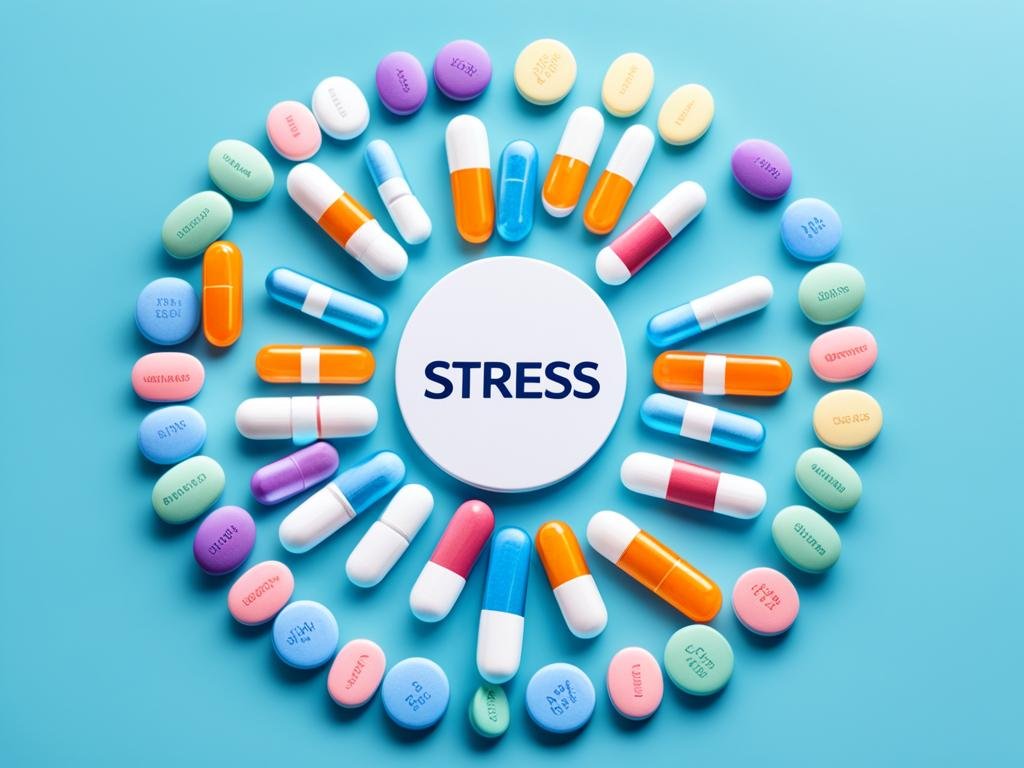Stress is what your body reacts with when it faces a threat. This could be a real danger or just something you worry about. How you see stress can come from your family history, what you’ve been through, and if things like money are tight. When you’re stressed, your heart might beat faster, you could sweat more, or feel like you can’t catch your breath. It’s common to feel scared, weak, or powerless. Medications like tranquilizers, beta-blockers, and drugs known as selective serotonin reuptake inhibitors (SSRIs) can help with these symptoms. Acupuncture and herbal remedies are other options. This article dives into how different medications work for stress and what you need to know about them.
Key Takeaways
- Various medications, including benzodiazepines, beta-blockers, SSRIs, and SNRIs, can help manage the symptoms of stress.
- Each medication type has unique mechanisms of action, dosages, and potential side effects that must be considered carefully.
- Medication is often most effective when combined with other therapies and lifestyle changes as part of a comprehensive approach to stress management.
- Potential risks of stress medications include addiction, dependency, and interactions with other drugs or substances.
- Alternative therapies such as MBSR, aromatherapy, and music therapy may also provide stress relief, often in conjunction with medication.
Understanding Stress and Its Impact
Stress is a feeling we get when we worry about something. It makes our heart beat faster and our breathing change. We might sweat, shake, or feel tired. And in our mind, we might feel like something bad is about to happen.
Symptoms of Stress
Too much stress can hurt our health. It can lead to high blood pressure and make our immune system weak. This can cause problems like not being able to digest food well, feeling very bad or anxious, and even getting too sad or depressed.
Physical and Mental Effects of Chronic Stress
Chronic stress is bad for both our body and our minds. It can make us catch illnesses easier and might even cause problems like ulcers. A lot of stress can also make our mental health worse, leading to feelings of worry or sadness.
| Statistic | Impact |
|---|---|
| Chronic stress can lead to physical symptoms such as chest pain or a feeling like your heart is racing. | This may affect up to 20% of individuals exposed to prolonged stress. |
| Stress can weaken the immune system, making individuals more susceptible to illnesses. | There is a 30% increase in chances of falling ill under chronic stress conditions. |
| Stress rashes, triggered by stress, are more common in women and individuals assigned female at birth (AFAB). | This demographic is affected 1.5 times more than men and those assigned male at birth (AMAB). |
| Individuals in their 20s, 30s, and 40s are most affected by stress rashes. | They make up 60% of reported cases in these age groups. |
| Stress can cause complications such as high blood pressure (hypertension). | There is a 25% higher risk among individuals experiencing chronic stress. |
| Chronic stress can lead to digestive system issues, such as ulcers and irritable bowel syndrome. | This impacts 15% of individuals dealing with prolonged stress. |
Benzodiazepines: Calming the Mind
Benzodiazepines are a type of prescription tranquilizer. Doctors give them for their calming effect. These meds make the body react more to a calm substance. This substance is gamma-aminobutyric acid. It helps the body feel calm.
These drugs are widely used around the world. When taken the right way, they help manage stress and anxiety. So, they are safe and good for those issues.
Common Types of Benzodiazepines
Xanax (alprazolam) and Valium (diazepam) are well-known benzodiazepines. Doctors give them for a short time or every now and then. But, using them a lot can be bad. It may lead to needing them all the time, trouble learning, and more falls.
Dosage and Duration of Use
The amount of benzodiazepines you get depends on many things. This includes how much you weigh, if you’re a boy or a girl, and how much you’re used to. A little dose can be 2.5-5 mg. A normal dose is 5-15 mg. A big dose is 15-30 mg. Doctors say to only use them for a short time. This should be 2-4 weeks. Using them longer can make you need more and more. This is not good.
Potential Side Effects and Precautions
Using benzodiazepines might make you sleepy, dizzy, forgetful, or confused. Using them a lot may lead to wanting them all the time. This is called addiction. This happens over a long time. Some people should be extra careful with these drugs. This includes if they have bad lung problems, stop breathing in sleep sometimes, or their liver/kidney isn’t working right. They may need less or not use these medicines at all.
Beta-Blockers: Controlling Physical Symptoms
Beta-blockers are medicines that help lower the body’s fight-or-flight response. They don’t stop anxiety but can ease its physical signs. These include fast heartbeat, trembling, and sweating. By learning about beta-blockers, you might find them useful in handling your physical responses to stress.
How Beta-Blockers Work
They stop the body from reacting to adrenaline, the stress hormone. Adrenaline causes reactions like a fast heart rate and sweating. Beta-blockers help by stopping these signals, reducing anxiety’s visible effects.
Common Types of Beta-Blockers
Propranolol and atenolol are popular beta-blockers for anxiety. A 2016 review showed propranolol works much like common anxiety drugs. But, they might not help as much with social fears.
Interactions and Side Effects
Let your doctor know about your health issues before taking beta-blockers. They could react with certain asthma or heart medications. Side effects may include tiredness, dizziness, or upset stomach. Serious effects are rare but could include heart issues or low blood sugar.
Always work with your doctor when using beta-blockers for anxiety. They can suggest the best type and amount for you. These drugs usually help most with short-term anxiety, like before a big event.
| Statistic | Value |
|---|---|
| Approximate number of adults in the U.S. who use beta-blockers | 30 million |
| Primary conditions beta-blockers are prescribed for | Heart conditions like high blood pressure or irregular heartbeat |
| Use of beta-blockers for anxiety | Off-label, not specifically FDA approved for this purpose |
| Effectiveness of beta-blockers in relieving physical anxiety symptoms | Shown to be effective in reducing symptoms like sweating, shaking, and racing heart |
| Conditions that may make beta-blocker use risky | Asthma, COPD, diabetes |
| Common side effects of beta-blockers | Dizziness, dry mouth/eyes, fatigue, insomnia, irregular heart rhythms, low blood pressure, nausea, slow heart rate |
| Recommended use of beta-blockers for anxiety | Situational anxiety, such as stage fright, rather than chronic anxiety disorders |
Selective Serotonin Reuptake Inhibitors (SSRIs)
Selective serotonin reuptake inhibitors (SSRIs) are a type of medicine. They help by keeping more serotonin in the brain. Serotonin is a chemical that makes us feel good. It helps with mood, emotion, and sleep. SSRIs can make anxiety and depression symptoms better. They work over time, unlike quick-help medicines. These medicines are often used for long periods to help with stress and mental health.
Mechanism of Action
SSRIs stop the brain from taking too much serotonin back. This means there is more to affect mood and feeling. SSRIs are safer and better than older antidepressants. Those older ones worked on lots of chemicals in the brain.
Common SSRIs for Stress Management
Common SSRIs for stress are Prozac (fluoxetine), Zoloft (sertraline), and Lexapro (escitalopram). You take them by mouth once a day. They start working in a few weeks. Many people feel less stressed with these medicines.
Potential Interactions and Side Effects
Some drugs can change how SSRIs work, or they can make side effects worse. Avoid taking SSRIs with NSAIDs, opioids, antiplatelets, and some other antidepressants. Side effects might be feeling sick, sleepy, having stomach issues, or not feeling sexual. It’s very important to talk with your doctor about any other medicines you take.
Serotonin and Norepinephrine Reuptake Inhibitors (SNRIs)
SNRIs are prescription drugs for depression. They raise levels of two brain chemicals: serotonin and norepinephrine. Unlike SSRIs, SNRIs also boost norepinephrine. This helps with attention, memory, and focus.
How SNRIs Differ from SSRIs
SSRIs focus only on serotonin. SNRIs, on the other hand, work on both serotonin and norepinephrine. This can be helpful for people with depression, anxiety, or certain chronic pains.
Common Types of SNRIs
Common SNRIs in the United States are:
- Duloxetine (Cymbalta)
- Desvenlafaxine (Khedezla)
- Levomilnacipran (Fetzima)
- Venlafaxine (Effexor XR)
They come as tablets, capsules, or liquid. You usually take them once a day. They might not start working right away. Your doctor may need to adjust the dose for the best effect.
Precautions and Side Effects
SNRIs can mix badly with some drugs, like MAOIs. They might cause nausea, constipation, or high blood pressure. Always tell your doctor about other drugs you take. Check your blood pressure often with an SNRI.
These drugs can sometimes make thoughts of suicide more common, especially in young people. Yet, they aren’t usually addictive. Still, stop them slowly under a doctor’s care to avoid feeling dizzy or sick.
Pregabalin: An Off-Label Option
Doctors often choose pregabalin (Lyrica) for anxiety when usual drugs fail. But, it’s not its main use. It’s a medicine for seizures. However, many find it helpful for anxiety, especially if other medicines don’t work.
Dosage and Administration
Normally, for stress and worry, people take between 150 mg and 600 mg of pregabalin a day. This gets split into 2 or 3 doses. Keep in mind that the right dose can change for each person. It can also take some weeks to see the full benefits. Doctors might suggest using it for a long time if it helps.
Potential Interactions
It’s key to tell your doctor about every medicine you take with pregabalin. This is because it might not mix well with some other drugs. This includes opioids, anti-anxiety meds, and certain depression drugs. Making sure they won’t mix badly is important.
Side Effects to Watch For
Pregabalin might cause you to feel tired, get headaches, or feel sick. You might also notice changes in mood or have a hard time seeing clearly. Others side effects include more diarrhea, puffy hands and feet, and feeling dizzy. Always keep an eye out for these and tell your doctor right away if you feel worried about them.
Medication for Stress: A Comprehensive Approach
Medicine is good for handling stress signs. But, it is best when used with other help and changing how we live. Talking with someone about stress and the things that make it can help. They might also suggest the right medicine plan with your doctor. Adding exercises, sleep tips, meditation, and eating well can lower stress too.
Combining Medications with Therapy
Using both medicine and talking helps in many ways. Medicine can ease how you feel and think when stressed. Talking and learning new ways to deal can lower stress for good. This mix makes coping with stress more successful.
Lifestyle Changes for Stress Management
Change lifestyle along with medicine and talking is key. Doing exercise, sleeping well, meditating, and eating right helps a lot. It makes you feel better and handle stress well. This trio approach is powerful in fighting off stress.
Weighing the Risks and Benefits
When thinking about stress meds, it’s key to look at the good and bad. Some meds for stress, like benzodiazepines, can be risky. They can become addictive. If not used carefully, they might harm our health. The dangers of these meds vary. They could cause a simple bad stomach. Or, they might even hurt our liver.
Addiction Potential and Dependency
Meds aiming to help with stress symptoms, such as benzodiazepines, come with a risk. This risk is getting hooked and needing them too much. Using these drugs for a long time can mean our body gets used to them. Then, it’s tough to quit without bad withdrawal feelings. Doctors and nurses should check up on folks taking these meds. They want to make sure everything is okay and no harm comes their way.
Considering Individual Factors
Figuring out which stress med and how much to take is a big deal. Health professionals need to think about lots of things about a person. This includes what’s in their health past, how they are now, and what’s worked before. The choice of using stress meds changes case by case. It depends on what risks a person can handle or is okay with.
Talking with a doctor, a drug expert, or someone who cares for us can really help. They give advice on how to deal with all the risks and good things about stress meds. By working with this team, we can pick the best and safest way to deal with our stress. Doing this can make us feel better and take care of our whole health.
Alternative Therapies for Stress Relief
Medication helps many folks with stress. But, some find relief in different ways. These ways aim to fix what causes stress and make you feel better overall.
Mindfulness-Based Stress Reduction (MBSR)
Mindfulness-Based Stress Reduction (MBSR) teaches you to stay in the moment. You focus on your breath and feel your body. This can lower your stress, anxiety, and help with feeling down.
Aromatherapy and Music Therapy
Aromatherapy and music help lots at work for some. Smelling things like lavender make you calm. And, soft music can take you to a peaceful place.
Other Complementary Approaches
Yoga, tai chi, and deep breathing help with stress too. They make you aware, feel better, and more in control. These routines bring peace to your mind and body.
Conclusion
Feeling stressed out is pretty common and can really mess with your mind and body. Luckily, there’s a bunch of meds that can help tame the stress beast. This includes tablets like benzodiazepines and SSRIs, which work in different ways.
Medicine isn’t all there is, though. It works best when you also make changes to how you live and think. Your healthcare team can help you mix meds with other helpful things, like talking therapy. Together, you can make a plan that kicks stress to the curb and makes you feel better.
To sum up, beating stress is usually about using different kinds of help. There are medicines and other stuff that together, can really help. A personalized plan with your doctors can really make a difference. It helps you deal with stress better and enjoy life more. Remember, help is out there, and you’re not alone.




